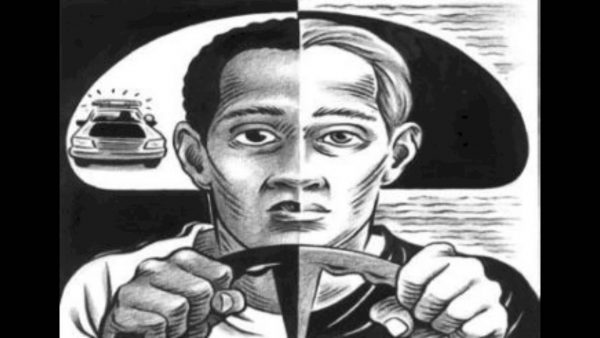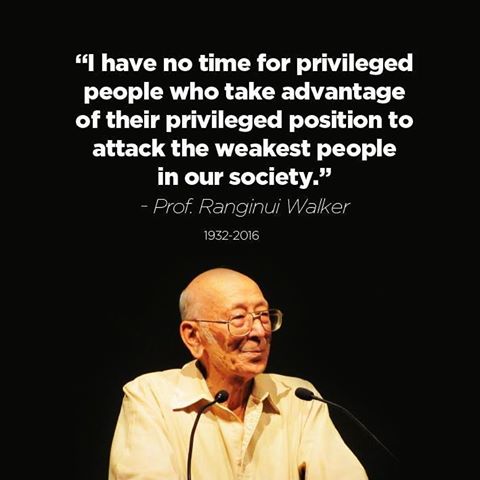
Criminals aren’t born, they’re created. They’re created in response to a combination of factors such as socioeconomic status (poverty) and class (social marginalisation and exclusion), family dysfunction, illiteracy, unemployment, substance abuse and mental ill-health. And they’re created by punitive laws, ‘penal populism’ leading to policies ‘strong on law and order’, unconscious bias in the police force, and subsequent distortions in remand terms and conditions, sentencing and incarceration.
The heat of the election campaign has inevitably led to the National Party pulling out its ‘tough on crime and punishment’ trick, to appeal to the (property based) interests of its conservative audience. Criminals are an easy target. Disempowered by a lack of freedoms that literacy and economic stability provide, even before incarceration, denied even the right to vote, prisoners epitomise a ‘criminalised’ underclass.
National’s proposed ‘boot camp’ military academy initiative to deal with youth offenders, echoes the bias and superficial reaction to law breaking too often seen in criminal justice narratives. The “lock them up” mentality in reality has a strong racial and class bias that’s manifest in a disproportionate number of young, Maori, men in prison, such that while Maori make up less than 15% of the New Zealand population, they are more than 50% of this country’s prisoners.
Media focus on criminal incidents tends to overstate the risk of being a victim of crime. But both the prevalence and impacts of crime are overstated. In fact, 3% of the population experience 53% of crime. The Dunedin longitudinal study found that 20% of the study cohort were responsible for 97% of criminal convictions. Not to belittle any harm from crime, but victims are often other criminals, and/or the same social group. Overall crime rates are going down, even while the number of those in prison is going up. Reaction to incidents of violent crime led to bail changes in the Bail Amendment Act (2013) and more prisoners in remand. And the government’s budget this year announced the bringing forward of $1 billion worth of spending, to build yet another prison.
New Zealand already has one of the highest rates of imprisonment in the world. We have 39% more people in jail per capita than the UK, 34% more per capita in prison than Australia, 73% more than Canada. Incidentally the latter two countries also have had colonisation histories, so although colonisation can explain the high proportion of indigeneity the countries’ total prison populations, in itself, it can’t explain why New Zealand’s prison population is so much higher than the other countries. National laws reflect a particular political setting; our high level of imprisonment is a political choice, a system of economics as well as law that specifically criminalises some more than others.
For some, criminality is over-determined. Studies show that if you come from a poor, dysfunctional family, your chances of going to jail are greater than otherwise. And countries with high levels of inequality are also those with high levels of incarceration. National economic conditions and the lottery of birth already sets some on a path toward imprisonment that’s hard to defy. 83% of prisoners are unemployed before they go to prison, meaning they’re already marginalised from the usual economic and social statuses that come with being part of the formal economy. 75% of prisoners are illiterate, meaning they’re excluded from the power of the written language, its function in bureaucratic and economic processes. It’s hard to get a licence if you can’t read and write. And if you can’t get a licence, it’s hard to get a job, and if you can’t get a job, there’s more chance you’ll go to prison…. And if you’re young and Maori you have a greater chance of being intercepted by the police, and more chance of having misdemeanour charges laid such as possession of cannabis which easily set you on the road to criminality.
But then also, Maori are seven times more likely to get a custodial sentence for their crimes than non-Maori, and 11 times more likely to be remanded in custody awaiting trial. Maori are less likely to have legal representation and more likely to plead guilty to crimes than their European counterparts. While you see more Maori criminality reported in the news, and more Maori in prisons, they are underrepresented in the police force, as policy makers, judges, lawyers and jurors. You’ll generally see fewer Maori represented even in the media as role models, except as exceptions, and more often they’re reflected as stereotypical criminal threats to social harmony and safety. For many Maori, their male role models are only seen in positions of power as parts of gangs or in jail, seldom in positions of power in the state or criminal justice apparatus. Maori have little stake in the western criminal justice system except as subjects of it.
To look at the systemic causes of our high imprisonment rate is not to absolve people of abhorrent crimes. But victimless crimes, drug and alcohol offences, a range of other illegal acts, could be dealt with more efficiently than through prison. The fact that imprisonment falls disproportionately on some sectors of the community perpetrates an injustice rather than the justice it’s intended to serve. No wonder it’s seen as illegitimate by those criminalised by its very structure. As if socio-economic exclusion and the principle of exercise of state coercion isn’t enough to marginalise and alienate you further from a society whose rules you already don’t accept, those on remand (whether they’re convicted of crimes later or not) are exposed to the violent, criminogenic forces in prison while they wait for their court hearings.
Then there’s the argument that prisons probably actually cause more crime. ‘JustSpeak’ say ‘our overuse of prison as a response to harm does not reduce the chance of that harm happening again, it increases it’. Once a person has been to jail, the chances of them going again increases by manifest degrees.
But in addition to the innocent victims of (violent etc) crime, and the additional harm done to those in jail, there are other harms to innocents perpetuated by New Zealand’s penal culture. There are about 23,000 children in this country who have one or more parent in prison. About 10,000 Maori children have a parent in jail, usually their dads, but also, often, their uncles, brothers, cousins, and sometimes their grandads as well. When the main breadwinner is locked up in jail, there’s further economic and domestic hardship, uncertainty, insecurity and disrupted learning for these kids, increasing the risk of the next generation also being at odds with the state, destined for criminality through illiteracy, poor socio-economic status and family dysfunction.
Despite evidence that investment in the first few years of a child’s life can positively affect health and social outcomes and make a difference to these and engagement and incarceration rates, forever, timely intervention and support through public and social services, and housing and income for at risk communities is less a priority for the Government, than building more prisons and ‘boot camps’.
In their recently released policy statement on prisons, The Opportunities Party talked about ‘Maori mass imprisonment”. TOP argue for giving prisoners more power, not less, with policies supporting a return of voting rights, increased addiction services, a strengthened Clean Slate Act, decriminalisation of marijuana. They quote from Finland which successfully managed to get its prison population down. To get the prison population down, society, bureaucracy and political institutions actually have to want to.
It’s apparent that the National Party would like our high current (Maori) rates of incarceration to continue. And by failing to address inequality, to invest in extended paid parental leave, literacy interventions, bail Act amendments, drug reform and meaningful change to the nature of imprisonment as a tool of power against an ethnic and demographic underclass, generations more young Maori men, will continue to go to jail. The odds are stacked against young, illiterate, poor Maori men in National’s game of modern monopoly. For them, there’s no passing go, no collecting their $200 at the start of the game, but instead they’re destined to go straight to jail.







Marx was wrong to write off the lumpenproletariat; they are where the revolution will come from.
And they gave crooked John Panama Key a Knighthood!!!!
Instead of a knighthood they allowed this “hood” to practice being a hood and this is what he is!!!!
Key made crime “respectable” the bloody criminal hood.
But when you get the idiot that wrote Keys biography, to print such vile in the Herald, no wonder Labour have always been up against it.
John Roughan once again spewing his right wing bile.
http://www.nzherald.co.nz/nz/news/article.cfm?c_id=1&objectid=11906524
The ‘devil makes work for idle hands’, when you have large portions of society, unemployed or underemployed, working for minimum wages and living in expensive, poor living conditions they sometimes look to other sources of income which may not be legal to supplement their income ?
Not saying it is right but it is a survival mechanism which then becomes a habit for some people ?
sometimes look to other sources of income which may not be legal to supplement their income……
https://cdn.thestandard.org.nz/wp-content/uploads/2012/02/doug-graham-et-al.jpg?x57220
http://noted-cdn.azureedge.net/media/8100/swney.jpg?width=806&bgcolor=ffffff
yep..quite alot of that goes on…
We have forced people to become “hunter gathers” again.
Sadly it is now rustling, trespass and stealing.
There are no commons/ areas to do these activities in cities.
People have a strong drive to provide, and when that fades or is crushed by WINZ????
Homelessness, incarceration or suicide. Grim choices.
Vote for change.
Great Article, thank you.
Thank you Christine for putting the horror of the out-of-control incarceration machine in its broader social context. We must continue to remind ourselves and each other of these things, to inoculate ourselves against the constant prison industry key messages that people could “choose” to be pampered millionaires, but instead “choose” to be criminalized, and deserve everything they get and more.
I think it’s worth keeping in mind, when debating these issues with people of the “tough on crime” variety, that people don’t stay in this mindset because they’ve carefully researched and considered the issues, and decided that more cops and prisons is really going to fix the problem. The full horror you expose in this piece – that criminal behaviour and the harms it causes is (mostly) the consequence of a series of political choices – is a painful reality to accept. The “tough on crime” mindset is a comfort zone that people occupy to protect themselves from the cognitive dissonance they’d otherwise have to face. The same is true of the beneficiary-bashing mindset we saw in full force in response to Metiria.
Clubbing people over the head with logic and statistics cannot help here. Somehow we need to come up with ways to help people feel safe enough to give alternative viewpoints fair consideration. We need to help each other work through the powerful and difficult emotions that often come with accepting new ways of seeing the world, and making the personal and political changes that are implied by these news ways of seeing.
if you watched Sunday 6 August our boot camps abused many young men. I was both disgusted and saddened watching this Great barrier island tragedy. And I see Willam Bell was one of them, little wonder he went on to be a killer very sad this happened to our young men this needs to be sorted and we need to make sure this never ever happens again. Now our government is calling for more boot camps.
Comments are closed.